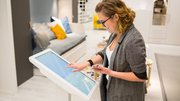News
Turning shoppers into buyers
April 13, 2005
There are countless theories about every aspect of the retail game: floor plan layouts, the psychology of in-store music, cross-promotion of different sections within the store, coupons, loyalty cards. The list goes on.
But ultimately, your goal as a retailer is so simple it's elegant. Your job is to get people to buy things.
Sounds easy, doesn't it?
Of course, the big question becomes "How do I do this?" And here is where all of those possible answers come in. But keeping in mind this core-level goal, it becomes clear that kiosks can do a lot of the work for you.
|
Expressed in very simple terms, the retailer needs to do three things in order to facilitate a sale: Give the customer the information they need to decide which product they want to purchase, help them locate that item within your store, and allow them to make the purchase.
All three of those steps - from product research to check-out - can be fully automated with a kiosk. Alternately, any or all of them can use a kiosk to augment a human solution.
But the benefits don't have to stop there. Some pretty powerful tools can be added to the third step, such as credit applications and loyalty or points programs. The kiosk can be engineered to make smart marketing suggestions, too. For example, if a customer is investigating digital cameras, the software can also point him toward rechargeable batteries, carrying cases and photo printers.
The kiosk as a virtual sales advisor has a very real benefit for shoppers - it never has a bad day. It is never in a grouchy mood, nor is it ever at a loss when it comes to accurate information that will help the shopper. If you've ever entered a large electronics store to learn more about some new technology, only to be "helped" by someone who is not only clearly ill-informed but downright unpleasant, you know what a huge boon this can be.
"Depending on the needs of a particular client, interactive kiosks can collect customer information or be used as an on-demand source for product information," said Elisabeth Scherer, a spokesperson for Phoenix, Ariz.-based kiosk company Diatouch, Inc. "Other suggested uses are product locaters, customer care tools and price comparison tools. Custom applications can create virtual sales advisors to convert more POS customer interactions into real sales."
It's all very exciting, but before you jump in, make sure that your new system will meet the needs of your existing customers. Surveys can help you understand what your customers want, what kinds of information they would like to have, and how they would like it presented to them.
"I recommend that my clients start the process with a review of their customer database and customer profile information, and then develop an orchestrated sales promotion plan," Callahan added.













